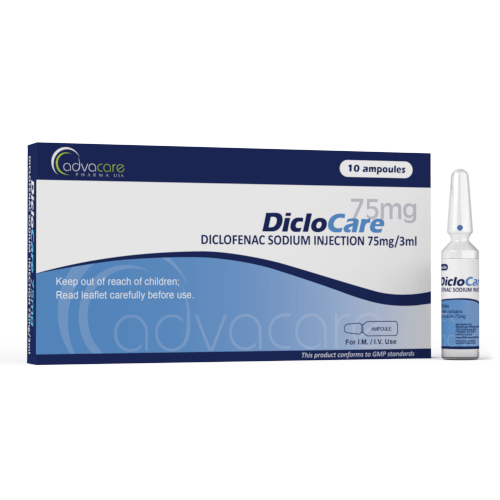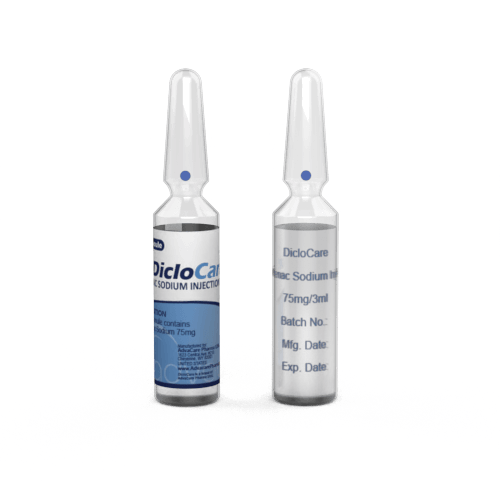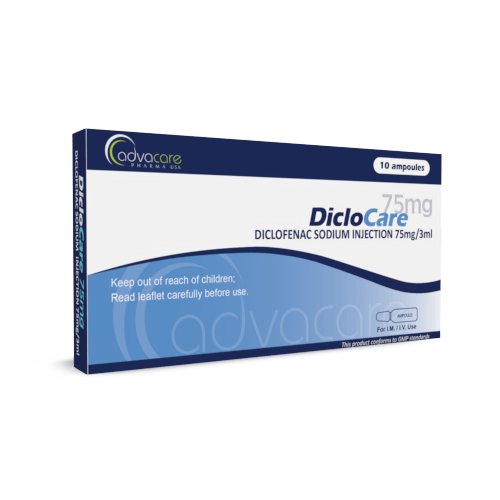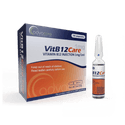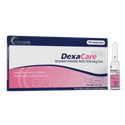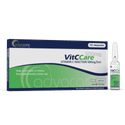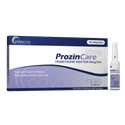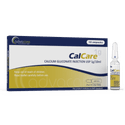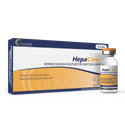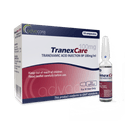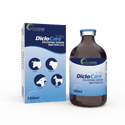- Home›
- Pharmaceuticals›
- Injections›
- Small Volume Injections›
- Diclofenac Sodium Injection
Diclofenac Sodium Injection
Dosage
Packaging
What is Diclofenac Sodium?
Active Ingredients: Diclofenac Sodium
Diclofenac Sodium Injection is a nonsteroidal anti-inflammatory drug (NSAID) used to manage mild to moderate acute pain related to kidney stones, arthritis, joints, gout, dysmenorrhea, or injuries. This medication may be used as a monotherapy or with opioid analgesics to treat moderate to severe pain.
As an NSAID, diclofenac sodium displays analgesic, anti-inflammatory, and antipyretic properties. Though the exact mechanism of action is not fully known, it is known to inhibit cyclooxygenase (COX-1 and COX-2). This inhibits the production of prostaglandins, which are involved in inflammation and pain signaling.
AdvaCare Pharma is a GMP-certified manufacturer and exporter of Diclofenac Sodium Injections, Diclofenac Potassium Tablets, and Diclofenac Sodium Tablets. We offer a wide range of high-quality and cost-effective medications that are available for distribution. These medications have been produced in our facilities in China, India, and the USA.
Why are we a leading Diclofenac manufacturer?
AdvaCare Pharma, a US-owned pharmaceutical company, is a manufacturer of Diclofenac Injection with GMP-compliant manufacturing facilities located worldwide. We conduct frequent GMP, third-party and internal facility inspections to ensure that our manufactured injectable treatments exceed the stringent requirements of importing countries and our distributors.
As a renown Diclofenac manufacturer and global supplier of 120+ pharmaceutical injection products, our global reach extends to over 65 markets ensuring that pharmaceutical distributors, hospitals, pharmacies, NGOs and government institutions receive the quality-assured treatments they need.
Uses
What is Diclofenac Sodium used for?
It is used to treat mild to severe pain associated with conditions like:
- kidney stones
- gout
- rheumatoid arthritis
- osteoarthritis
- ankylosing spondylitis
- dysmenorrhea
How are Diclofenac Sodium Injections used?
This medication is manufactured as a solution that can be injected intramuscularly (IM) or intravenously (IV). It should be administered by a healthcare professional in a hospital or clinic setting.
Patients must be well hydrated prior to administration of Diclofenac Sodium Injections.
What dose should be given and for how long?
For the treatment of acute pain via:
- IV Bolus: the recommended dose is 37.5mg administered over 15 seconds. Injections can be repeated every 6 hours, as needed. Do not exceed the maximum daily dose of 150mg.
- IV Infusion: the recommended dose is 75mg, infused over 30-120 minutes. Infusions may be repeated after 4 to 6 hours, if necessary.
- IM: the recommended dose is 75mg, given as a deep IM injection. IM injections can be repeated after 6 hours, if necessary.
Treatment with Diclofenac Sodium Injection should not exceed 2 days.
Diclofenac sodium is not interchangeable with diclofenac potassium or other diclofenac products; reassess the dose if switching between products.
Refer to a doctor or pharmacist for guidelines on dosage. The dosage is based on medical condition, response to the treatment, age, and weight.
Who can use Diclofenac Sodium?
Diclofenac Sodium Injection can be administered to adults, but caution is advised for specific groups of patients.
Pregnant NSAID use at 20 weeks gestation or later may cause fetal renal dysfunction or impairment, heart problems, or lower amniotic fluid. NSAID use at 30 weeks gestation or later may increase the risk of adverse fetal events, such as premature closure of the fetal ductus arteriosus. If diclofenac treatment is deemed medically necessary during the 3rd trimester, doses should be the lowest necessary to produce benefit, and treatment should be as short as possible.
Diclofenac use past 30 weeks of pregnancy is not recommended. Diclofenac administration during childbirth is not recommended, as it may delay labor and increase the incidence of stillbirth.
Those who are trying to get pregnant should avoid diclofenac, as it can delay ovulation and reversibly impact fertility.
Nursing Diclofenac may be excreted in human milk in small amounts. The effects on nursing infants are currently unknown. Nursing while taking diclofenac may be safe, but other medications may be preferred. If deemed medically necessary, the potential patient benefits and infant risks should be carefully considered.
Pediatric The safety and efficacy of Diclofenac Sodium Injection have not been established in pediatric patients.
Geriatric Current data have not demonstrated differences in responses to diclofenac sodium between older adults (≥ 65 years) and younger adults. However, due to the increased risk of adverse gastrointestinal (GI) and cardiovascular (CV) events, dosing in geriatric patients should be done with caution because of age-related decreases in renal function and concomitant disease and drug therapy.
Other warnings
In patients with mild hepatic insufficiency, dosage reductions are not necessary. In patients with moderate to severe hepatic insufficiency, Diclofenac Sodium Injection has not been studied and is not recommended for use.
Cases of rare, severe hepatic reactions, including liver necrosis, jaundice, fulminant hepatitis (with and without jaundice), and liver failure, some of which resulted in fatalities or liver transplantation, have been reported with diclofenac use. These cases have primarily been reported with oral diclofenac; however, the risk should still be considered with Diclofenac Sodium Injection use.
Patients at an increased risk for hepatotoxicity should have their transaminase levels monitored. Diclofenac treatment should be discontinued immediately if elevated transaminases persist or worsen, if signs of liver disease develop, or if symptoms of systemic liver dysfunction occur.
In patients with mild renal insufficiency, dosage adjustments are not necessary. In patients with moderate to severe renal insufficiency, Diclofenac Sodium Injection use is contraindicated. Long-term NSAID use can result in renal papillary necrosis and other renal injury. This risk of renal toxicity may be lower with Diclofenac Sodium Injection, as it is only indicated for short-term therapy.
Clinical studies of various NSAIDs have shown an increased risk of serious CV events, including myocardial infarction and stroke, which can be fatal. It is unclear if the risk of adverse CV events is similar for all NSAIDs. The increased risk of adverse CV events from NSAID use is similar in those with and without CV disease or dysfunction, however, those with CV disease or dysfunction had higher incidences of adverse CV effects. These effects can begin as early as the first weeks of treatment and have mostly been observed at higher doses. There is no evidence that aspirin can mitigate these risks, and aspirin use should be avoided, as it increases the risk of adverse GI events.
Diclofenac Sodium Injection use after coronary artery bypass graft is contraindicated due to the increased incidence of myocardial infarctions and strokes with NSAID use following surgery. Diclofenac use in patients with a recent myocardial infarction should be avoided.
NSAIDs, including diclofenac sodium, can cause serious and potentially fatal GI adverse events, including inflammation, bleeding, ulceration, and perforation of the esophagus, stomach, or intestines. Those with a longer duration of NSAID treatment, who are concomitantly using oral corticosteroids, aspirin, anticoagulants, selective serotonin reuptake inhibitors (SSRIs), or serotonin and norepinephrine reuptake inhibitors (SNRIs), and who have a history of liver disease, peptic ulcers, GI bleeding, or bleeding disorders are at an increased risk. These serious adverse events can occur at any time, and only approximately 20% of patients are symptomatic. Most cases involve long-term treatment, but short-term treatment with Diclofenac Sodium Injection is not without risk.
Concomitant use of diclofenac with other NSAIDs is not recommended due to the increased risk of adverse GI events.
Potentially fatal anaphylactic reactions that require immediate medical attention have been reported with NSAID use. Diclofenac hypersensitivity can cause adverse skin events, such as exfoliative dermatitis, Stevens-Johnson Syndrome (SJS), and toxic epidermal necrolysis (TEN), some of which can be fatal and can occur with or without warning. Diclofenac should be discontinued at the first sign of skin rash or other hypersensitivity reactions.
The antipyretic and anti-inflammatory effects of diclofenac may mask the clinical signs of present infection.
Side Effects
As with all pharmaceuticals, some unwanted effects can occur from the use of Diclofenac Sodium Injection.
Common side effects include, but may not be limited to:
- nausea
- upset stomach
- constipation
- headache
- dizziness
- itching or pain at injection site
- vomiting
Serious side effects may include:
- signs of an allergic reaction
- rash, fever, swollen glands, severe weakness, or jaundice
- signs of a heart attack or stroke
- flu-like symptoms
- signs of internal bleeding (bloody or tarry stools, vomiting blood)
For a comprehensive understanding of all potential side effects, consult a medical professional.
If any symptoms persist or worsen, or you notice any other symptoms, please call your doctor.
Precautions
Do NOT use Diclofenac Sodium Injection if:
- You are allergic to diclofenac sodium or other NSAIDs.
- You have a history of peptic ulcers or bleeding in the digestive tract.
- You have asthma, kidney problems, or liver problems.
- You are treating pain following coronary artery bypass graft surgery.
- You have a history of cardiovascular disease, heart attack, or stroke.
- You have high blood pressure and/or use heart or blood pressure medication, including diuretics.
- You use steroid medicines.
Before treatment, consult your doctor regarding any medications you are taking to address potential drug interactions.
This medication may not be suitable for people with certain conditions, so it is important to consult with a doctor if you have any health conditions.
References
Clinical Observation on Therapeutic Effect of Electroacupuncture Combined with Diclofenac Sodium in Treatment of Acute Gouty Arthritis: A Randomized Controlled Study
The main objective of this research was to observe the clinical effect of electroacupuncture (EA) combined with diclofenac sodium (DS) in the treatment of acute gouty arthritis (AGA).
Patients with AGA were randomly divided into three groups: the EA + DS treatment group (i.e., EA + DS group), the low-dose DS treatment group (i.e., low-dose DS group), and the conventional-dose DS treatment group (i. e., conventional DS group).
The conclusion of this study is that EA combined with DS can improve AGA patients’ joint pain and functional status and improve their quality of life. This combined treatment can reduce the levels of inflammatory markers and SUA, leading to fewer adverse reactions in AGA patients.
You might be interested in...
Why AdvaCare Pharma?
As an industry leader, we are aware of our responsibility to provide affordable and sustainable solutions to improve healthcare worldwide.
